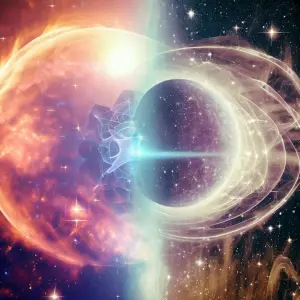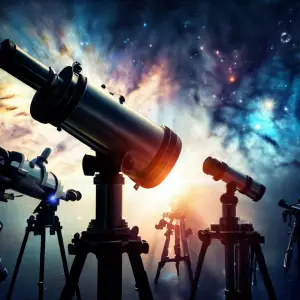Welcome to the ultimate celestial showdown: Cosmology vs.
Astronomy! Wondering what sets these cosmic cousins apart? Get ready for mind-blowing discoveries, starry anecdotes, and a journey to unravel the universe’s secrets.
Hold on tight for an astronomical adventure like no other!
Cosmology Vs Astronomy
Cosmology vs. Astronomy: Embracing the Synergy

In the vast expanse of the cosmos, two fields stand out, constantly seeking to unravel the mysteries of the universe:
Discover Your FREE Personalized Moon Reading NowCosmology and Astronomy. Both disciplines delve into the celestial realm, exploring the cosmos in unique ways.
Let’s embark on a journey to understand how these fascinating fields are interconnected and how they each contribute to our understanding of the universe.
Related Article: What Does R Mean In Astrology
Defining Cosmology and Astronomy

Cosmology deals with the grand questions that have captivated humanity for centuries: the origin, evolution, and ultimate fate of the cosmos.
Discover Your FREE Personalized Moon Reading NowIt delves into the fundamental nature of space, time, and everything that exists within our universe.
Cosmologists ponder the Big Bang theory, study dark matter and dark energy, and contemplate the existence of multiple universes.
Their curiosity knows no bounds as they seek to comprehend the cosmos on a cosmic scale.
Astronomy, on the other hand, focuses on observing and understanding celestial objects within our universe. It involves the study of stars, planets, galaxies, and beyond.
Astronomers utilize powerful telescopes and other observational tools to explore the wonders of the night sky.
Discover Your FREE Personalized Moon Reading NowFrom mapping distant galaxies to studying the properties of exoplanets, astronomy offers a front-row seat to the captivating show that the universe puts on.
Related Article: What To Do During Lunar Eclipse Astrology
Tracing the Origins of Cosmological Studies
The history of cosmology dates back to ancient civilizations, where the night sky served as both a source of wonder and a practical guide for agriculture and navigation.
Early astronomers observed the movements of celestial bodies and developed models to explain the cosmos’ workings.
Ancient cultures weaved myths and stories around the stars, attributing divine significance to celestial events.
Discover Your FREE Personalized Moon Reading NowAs human knowledge expanded, so did the study of cosmology. In the early modern era, scientists like Copernicus and Galileo made groundbreaking discoveries, challenging the geocentric view and propelling astronomy forward.
Theories like Edwin Hubble’s observation of the universe’s expansion in the 20th century marked significant milestones in our understanding of cosmology.
Telescopes in Astronomy and Cosmology

Telescopes are instrumental tools in both astronomy and cosmology.
These marvels of engineering allow us to peer far beyond what the naked eye can see, capturing the faint light of distant celestial objects.
Discover Your FREE Personalized Moon Reading NowAstronomers use telescopes to observe planets, stars, and galaxies, gaining insights into their composition, behavior, and interactions.
In cosmology, telescopes play an equally crucial role.
By studying the cosmic microwave background radiation, a remnant of the universe’s early moments, cosmologists can glean valuable information about the universe’s age, structure, and evolution.
Advanced telescopes, both on the ground and in space, continue to push the boundaries of our knowledge.
Astrophysics: Bridging the Gap
At the intersection of cosmology and astronomy lies astrophysics, a field that serves as a bridge between the two.
Discover Your FREE Personalized Moon Reading NowAstrophysicists employ the laws of physics to understand the behavior of celestial objects, from the nuclear reactions in stars to the gravitational dynamics of galaxies.
Astrophysics connects to cosmology through the study of cosmic phenomena like black holes and quasars.
These enigmatic entities play crucial roles in shaping the structure of the universe.
Understanding their properties provides valuable clues about the universe’s overall nature.
The Benefits of Collaboration
Collaboration between astronomers and cosmologists is pivotal for making significant progress in understanding the cosmos.
Discover Your FREE Personalized Moon Reading NowWhile astronomers focus on observations and data collection, cosmologists develop theoretical models that explain the universe’s workings.
By combining their expertise, they form a powerful symbiotic relationship, propelling our knowledge of the universe forward.
For instance, astronomers’ observations of the cosmic microwave background radiation confirmed predictions made by cosmological models, validating our understanding of the universe’s early moments.
Similarly, cosmological theories have guided astronomers in their search for dark matter, an elusive component believed to shape the large-scale structure of the cosmos.
Inspiring the Next Generation
As we delve into the wonders of the cosmos, it’s essential to inspire the next generation of astronomers and cosmologists. Their curiosity and passion will drive future discoveries and advancements.
Discover Your FREE Personalized Moon Reading NowBy engaging young minds with captivating stories of the universe’s grandeur and the mysteries that await, we can ignite a spark of curiosity that will fuel their pursuit of knowledge.
Embracing Complementary Nature
Cosmology and astronomy are like two sides of a cosmic coin.
They complement each other, offering unique perspectives on the universe.
Cosmology asks the grand questions, delving into the universe’s deepest mysteries, while astronomy explores the intricacies of celestial objects, revealing their fascinating stories.
As we embrace the synergy between these fields, we gain a more profound understanding of our place in the cosmos.
Discover Your FREE Personalized Moon Reading NowTogether, cosmology and astronomy weave a tale of the universe’s past, present, and future—an ever-unfolding narrative that leaves us in awe of the cosmos and its mysteries.
FAQs About Cosmology Vs Astronomy
Which is better: Astronomy or Cosmology?
Astronomy and cosmology are not inherently better or worse than each other.
They are distinct fields with different focuses. Astronomy deals with the observation and study of celestial objects within the universe, while cosmology delves into the origin, evolution, and structure of the universe itself.
What is the difference between Astronomy, Cosmology, and Astrophysics?
Astronomy focuses on celestial objects, their properties, and their interactions.
Cosmology studies the universe’s overall structure, history, and fundamental questions.
Discover Your FREE Personalized Moon Reading NowAstrophysics bridges the gap between these two fields, applying physics to understand the behavior of celestial objects.
What is Cosmology vs. Astronomy vs. Astrology?
Cosmology and astronomy are scientific disciplines that study the universe and celestial objects.
In contrast, astrology is a belief system that suggests a connection between celestial positions and human destinies.
Astronomy and cosmology rely on empirical evidence, while astrology lacks scientific support.
Do cosmologists work at NASA?
Yes, NASA employs cosmologists and astrophysicists in their various research and space exploration endeavors.
Discover Your FREE Personalized Moon Reading NowThese scientists contribute to projects related to understanding the cosmos and the universe’s fundamental properties.
Does ISRO hire cosmologists?
ISRO, the Indian Space Research Organisation, primarily focuses on space research, satellite technology, and space exploration.
While cosmologists might not be directly employed for astronomical research, ISRO may collaborate with them on specific projects.
Can I join NASA after working in ISRO?
The possibility of joining NASA after working at ISRO depends on various factors, including qualifications, experience, and job openings.
NASA’s recruitment process is open to candidates worldwide, and both organizations have collaborated on space missions.
Discover Your FREE Personalized Moon Reading NowWhat is India’s NASA called?
India’s equivalent of NASA is the Indian Space Research Organisation (ISRO).
ISRO is responsible for space research, satellite launches, and other space-related activities in India.
What is the highest-paying job at ISRO?
The highest-paying jobs at ISRO are typically leadership and top managerial positions.
Scientists, engineers, and project directors may also have higher-paying roles within the organization.
Can an Indian get a job at SpaceX?
Yes, SpaceX, a private space exploration company founded by Elon Musk, hires talent from around the world, including India.
Discover Your FREE Personalized Moon Reading NowThey recruit engineers, scientists, technicians, and other professionals to work on their ambitious space projects.
Will NASA hire Indians?
Yes, NASA has a history of hiring talent from various countries, including India. NASA’s workforce is diverse and includes scientists, engineers, astronauts, and researchers from around the globe.
Does SpaceX recruit from IIT?
SpaceX has been known to hire from prestigious institutions like the Indian Institutes of Technology (IITs) in India and other top universities worldwide.
They actively seek out talented individuals for their ambitious space missions.
How to get a job in a space station in India?
Currently, India does not have its own space station.
Discover Your FREE Personalized Moon Reading NowHowever, to work on space-related projects or join ISRO, aspiring individuals can pursue relevant engineering or scientific degrees, gain experience in space research, and stay updated on job openings at ISRO or other space-related organizations.
Which field makes the most money?
The field that makes the most money can vary depending on factors such as location, industry, and individual expertise.
High-paying fields often include finance, technology, and medicine.
Who earns the highest salary in the world?
The highest salary earners in the world are often found in top executive positions of multinational corporations, entrepreneurs, and entertainment industry stars.
Their earnings can reach millions or even billions of dollars annually.
Discover Your FREE Personalized Moon Reading NowWho owns the highest salary in India?
In India, business tycoons, industrialists, and successful entrepreneurs are among those who own the highest salaries.
They lead prominent companies and contribute significantly to the nation’s economy.
Final Thoughts About Cosmology Vs Astronomy
Cosmology and astronomy are captivating fields that delve into the mysteries of the universe.
Cosmology explores the universe’s origins, evolution, and fundamental nature, while astronomy focuses on observing celestial objects and unraveling their secrets.
Both fields complement each other, leading to significant discoveries and enriching our understanding of the cosmos.
Discover Your FREE Personalized Moon Reading NowAs we embrace the wonder of the universe, it’s vital to inspire the next generation of astronomers and cosmologists, ensuring humanity’s continued exploration of the cosmos and the unfolding of new cosmic truths.
Together, these disciplines weave a story of curiosity, knowledge, and awe, painting a vivid picture of our place in the cosmos.
